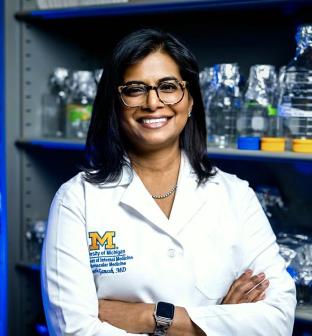A research program that was given a boost by a Taubman Institute Innovation Project (TIIP) grant has been selected to be part of a consortium sponsored by the Leducq Foundation, an international grant-making organization.
Physician-researchers at Michigan Medicine formed a team to study dysplasia-associated arterial diseases (DAAD), which are characterized by abnormal development of blood vessels. Powered by a TIIP grant, and supported by the Taubman Institute’s project management team, they have established a precision health network to study DAAD and related disorders at the genetic level, using data from a cohort of child and adult patients.
The DAAD TIIP team, headed by Santhi Ganesh, MD, also led efforts to establish a worldwide collaborative of researchers in the field. And now the Leducq Foundation, established in 1996 to support cardiovascular-related discovery, has funded a network of collaborators dubbed ALIGN-FMD (Advancing Learning and Innovation in a Global Network for Fibromuscular Dysplasia), to focus on one of the disorders under the DAAD umbrella.
Dr. Ganesh and a colleague in Australia will co-lead the network, which also includes researchers in France and the United Kingdom.
“Despite a tremendous need, at the moment there are no specific therapies or treatments for FMD,” Leducq said in its announcement.
“We have brought together an international team of scientists, doctors and world-leading FMD experts who are dedicated to understanding this disease and developing the field to include new investigators who we will train, ensuring the long-term sustainability of our mission. Most importantly, for a disease that has remained a medical mystery for almost 100 years, we are committed to making major progress on FMD.”
Dr. Ganesh is a professor of Internal Medicine and professor of Human Genetics, where she is jointly appointed. Her clinical work is in the Division of Cardiovascular Medicine and Section of Vascular Medicine, focused on the evaluation and care of patients with cardiovascular diseases and potential genetic disorders.
Dr. Ganesh runs an independent research laboratory that is working to define the genetic basis of cardiovascular diseases and study these genetic effects in model systems, bringing together trainees from all levels and faculty from diverse clinical and scientific backgrounds. Dr. Ganesh has published over 130 scientific papers in high impact journals.






